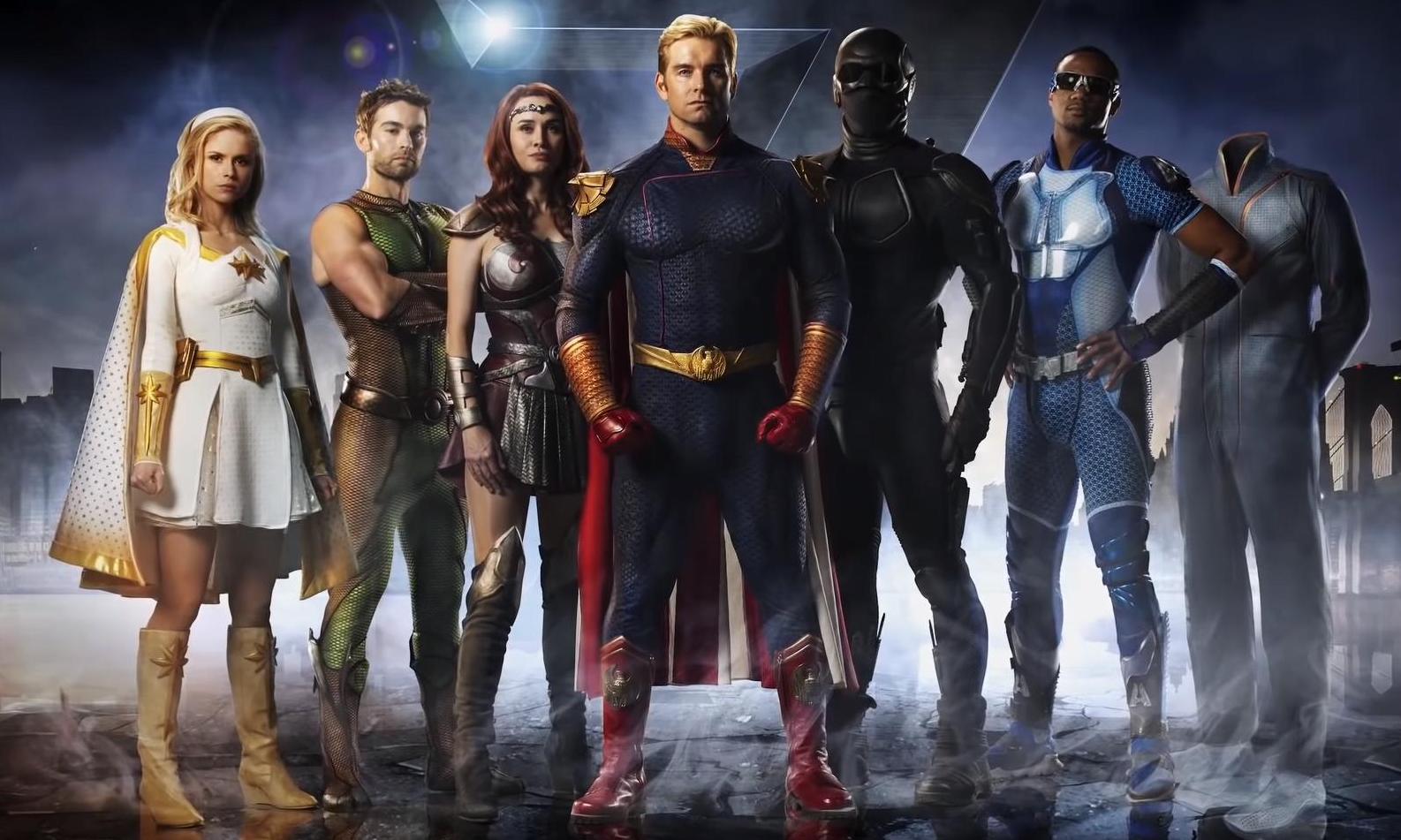The Boys Review

The Boys Review: Amazon Prime’s subversive series, The Boys, takes a sharp satirical jab at the superhero genre. Set in a world where Supes, as they’re called, are treated as celebrities and wield immense power with little accountability, the series follows a ragtag group of vigilantes, The Boys, who fight against these corrupt heroes.

Beyond Capes and Tights: A Gritty and Violent Deconstruction
The Boys departs from the idealized portrayals of superheroes in mainstream media. The series dives into the dark side of this trope, showcasing the consequences of unchecked power and the potential for superheroes to become corrupted by fame and adoration. The Supes are often arrogant, self-serving, and responsible for collateral damage. This cynical and violent approach challenges viewers’ expectations of the superhero genre, forcing them to confront the potential dangers of unchecked power.
The Boys Themselves: A Flawed and Relatable Crew
The protagonists themselves, The Boys, are far from perfect. Led by the jaded Billy Butcher, they are driven by a mix of revenge, personal demons, and a genuine desire to curb the excesses of the Supes. Their methods are often brutal and morally questionable, blurring the lines between heroes and villains. This complexity makes them more relatable characters, as they grapple with their own flaws while facing a seemingly insurmountable enemy.
Vought International: The Corporate Face of Evil
The Boys’ primary antagonist isn’t a single Supervillain but Vought International, a powerful corporation that manages the Supes and controls their public image. Vought prioritizes profit over public safety, manipulating the media and suppressing scandals to maintain the facade of benevolent superheroes. This portrayal critiques the growing influence of corporations in modern society and their ability to manipulate public perception for their own gain.
Satire with Bite: Taking Aim at Social and Political Issues
The Boys transcends the superhero genre by using its fantastical elements to satirize real-world issues. The series tackles themes of celebrity worship, corporate greed, media manipulation, and political corruption. Superheroes become a metaphor for unchecked power in the hands of the elite, prompting viewers to question societal norms and the influence of mass media.
Beyond Black and White: Exploring the Moral Gray Areas
The strength of The Boys lies in its refusal to paint a clear picture of good versus evil. The characters are morally ambiguous, often forced to make difficult choices. Some Supes genuinely want to do good but struggle with their own flaws and Vought’s manipulation. This exploration of moral complexities keeps the narrative engaging and sparks discussions about the challenges of tackling systemic problems with questionable methods.
The Price of Power: Exploring the Psychological Toll
The series delves into the psychological toll of wielding immense power. Supes like Homelander, the seemingly invincible leader of The Seven, struggle with their dark sides and the pressures of maintaining a perfect public image. This exploration of the human cost of power adds depth to the narrative and challenges the idealized image of superheroes as emotionless, invincible beings.
A World of Graphic Content: Pushing the Boundaries of Television
The Boys is known for its graphic violence, gore, and strong language. While this might alienate some viewers, it serves a purpose. The brutality emphasizes the consequences of unchecked power and the horrors inflicted by corrupt Supes. It also contributes to the show’s dark and satirical tone, differentiating it from more sanitized superhero narratives.
The Female Gaze and Social Commentary on Masculinity
The Boys offers a unique female perspective on the superhero genre. Characters like Starlight and Kimiko challenge the typical hyper-sexualized portrayal of women in superhero stories. The series also critiques toxic masculinity, showcasing the destructive nature of unchecked aggression and the emotional vulnerability hidden beneath the surface of some male characters.
Building a Universe: Expanding the World of The Boys
The Boys has spawned a successful spin-off series, The Boys Presents: Diabolical, and explores other corners of its universe through animated shorts. This expansion showcases the series’ potential to delve deeper into the backstory of its characters and explore different aspects of this world dominated by Supes.
The Legacy of The Boys: A Genre-Bending Cultural Phenomenon
The Boys has established itself as a cultural phenomenon. Its sharp satire, complex characters, and unflinching portrayal of violence have captured the imagination of audiences worldwide. The series has pushed the boundaries of the superhero genre, prompting viewers to question their expectations and sparking conversations about the dark side of power and celebrity culture.
Building upon the groundwork laid in the previous section, let’s explore the challenges and opportunities The Boys faces, delve into the series’ balancing act between satire and character development, and consider its long-term potential.
Walking the Tightrope: Satire, Shock Value, and Character Investment
The Boys thrives on its ability to shock viewers with over-the-top violence and scathing social commentary. However, this approach can be a double-edged sword. While the shock factor initially grabs attention, relying heavily on it can overshadow character development and emotional investment in the long run. Striking a balance between satire and genuine character growth will be crucial for the series’ continued success.
The Peril of Parody: Avoiding Repetition and Genre Fatigue
The Boys risks falling into the trap of parody if it solely relies on deconstructing superhero tropes. Finding new elements to satirize within the genre while organically developing character arcs and the overall narrative is critical to avoid becoming predictable and repetitive.
Beyond the Shocking: Exploring the Emotional Core
While the series excels at satire, creating genuine emotional connections with its characters is vital for long-term audience engagement. Exploring the characters’ backstories, motivations, and internal conflicts can add depth and make their struggles more relatable. For instance, delving into Homelander’s fractured psyche or Butcher’s grief over his wife’s death could add emotional resonance to the narrative.
The Power of Vulnerability: Humanizing the Supes
The current portrayal of most Supes presents them as one-dimensional villains. Introducing internal conflicts, showcasing their vulnerabilities, and exploring their motivations beyond self-interest could lead to a more nuanced portrayal. This approach could create a more complex narrative and challenge viewers’ perceptions of the characters.
The Future of Vought: Exploring the Corporation’s Inner Workings
Vought International serves as a powerful antagonist, but further exploration of its inner workings could add depth to the narrative. Showcasing the struggles of lower-level employees caught between corporate greed and a desire to do good, or delving into power struggles within the company, could offer fresh perspectives on the organization’s machinations.
The Boys Themselves: Fractures and Evolution
The internal dynamics of The Boys present an opportunity for engaging character development. Their fractured pasts, conflicting ideologies, and clashing personalities could lead to internal conflicts and force them to re-evaluate their methods. Witnessing their evolution, both individually and as a team, can be an intriguing journey for viewers.
The World Beyond America: Expanding the Scope
The Boys primarily focuses on the American superhero scene under Vought’s control. Exploring the existence of other corporations managing Supes in different parts of the world could be a fascinating avenue to expand the narrative. This broader perspective could introduce new threats, cultural clashes, and opportunities for unlikely alliances.
The Legacy of The Boys: A Catalyst for Change in the Genre?
The Boys has demonstrably influenced the superhero genre. Its success demonstrates an audience appetite for more nuanced and critical portrayals of superheroes. Whether future superhero stories adopt a more satirical or socially conscious approach remains to be seen, but The Boys has undoubtedly opened doors for genre experimentation.
Can The Boys Maintain its Bite?
The continued success of The Boys hinges on its ability to adapt and evolve. Maintaining its signature satire while fostering deeper character connections will be key. Expanding the narrative universe, exploring the complexities of its existing characters, and staying relevant with contemporary social issues will ensure The Boys remains a force to be reckoned with in the superhero genre, challenging viewers’ expectations and sparking thought-provoking conversations long after the credits roll.

Leave a Comment